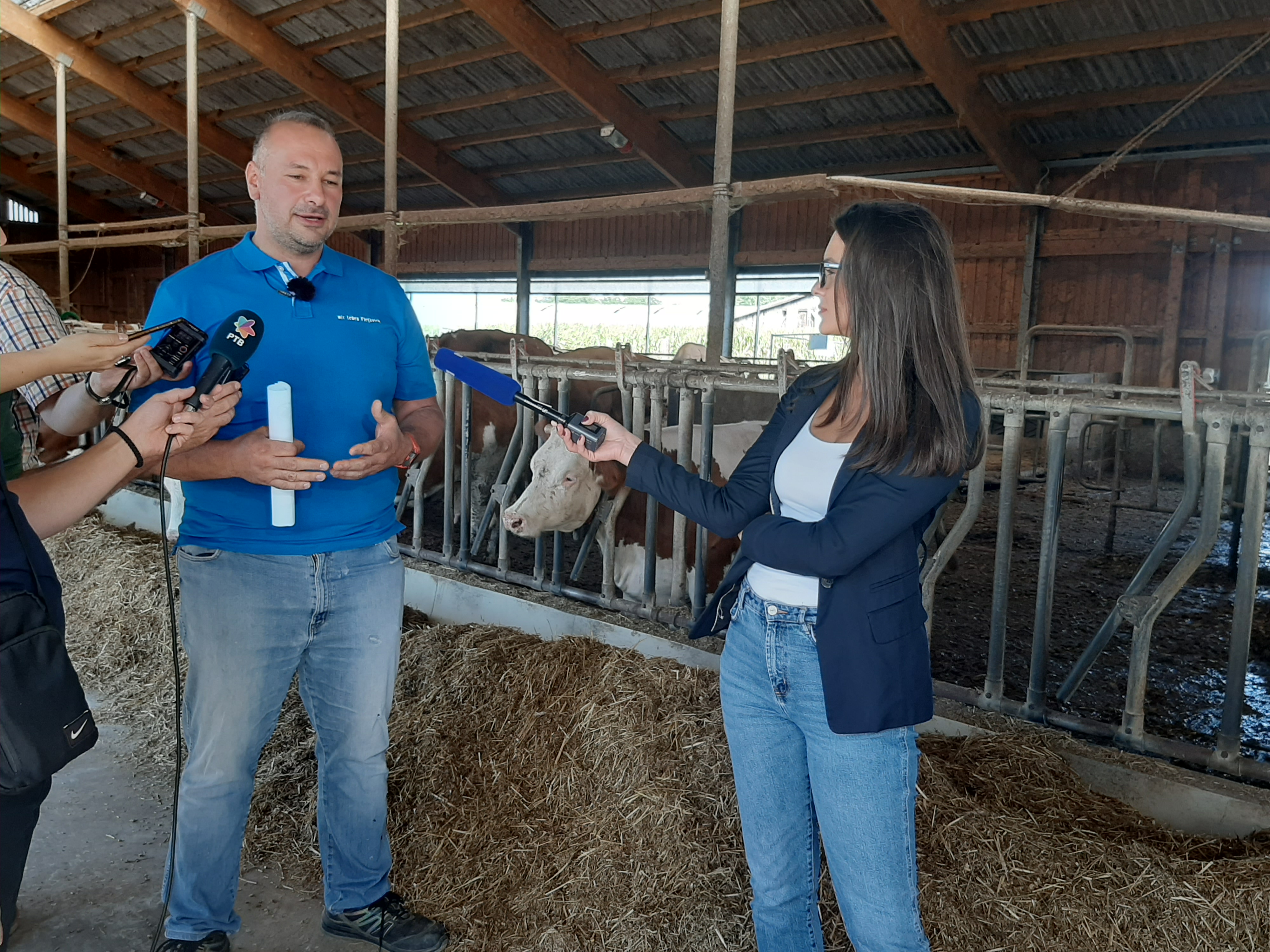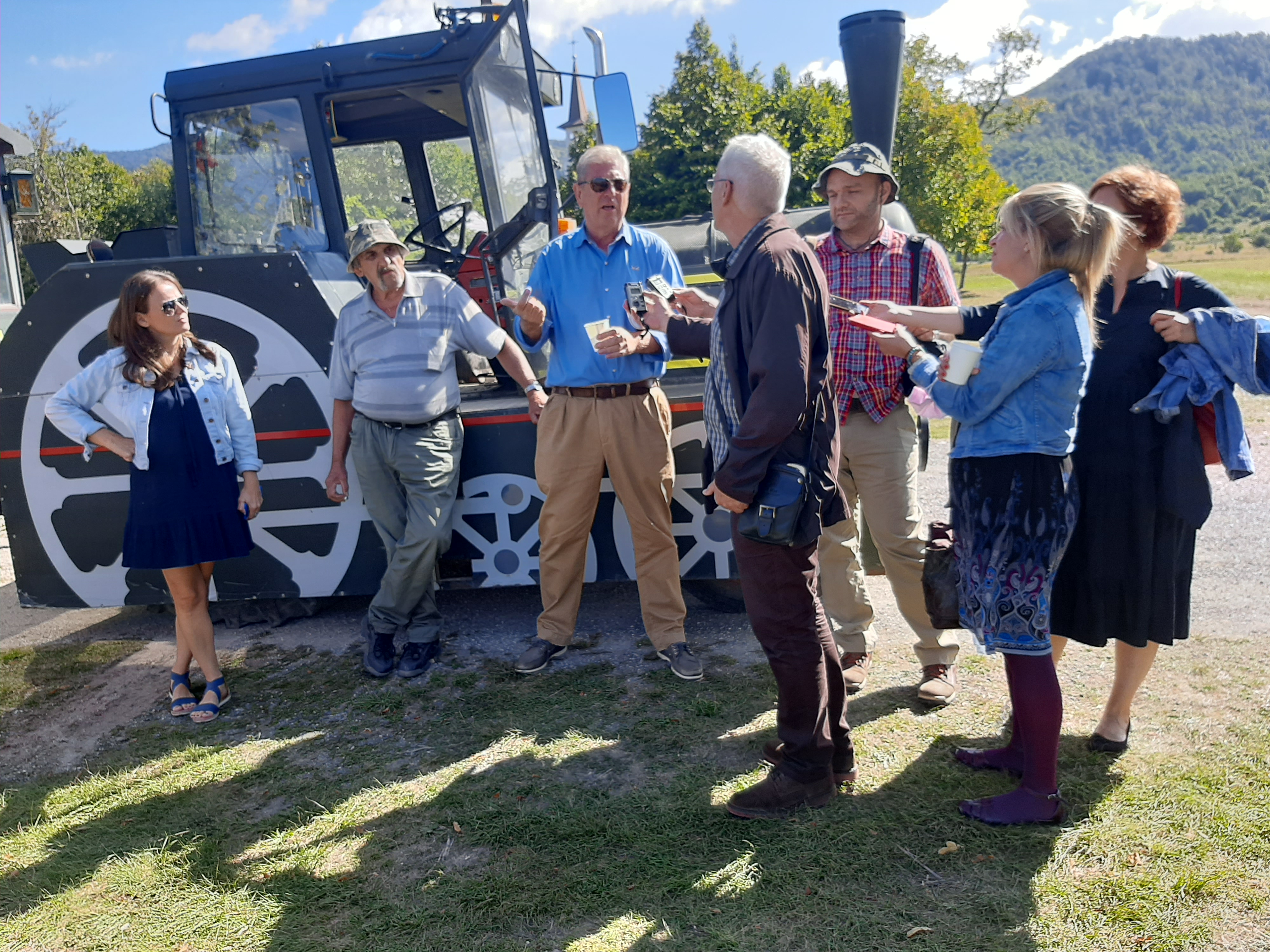During a five-day media trip to Croatia, journalists from nine Serbian media outlets specialised in agriculture had the opportunity to investigate how Croatian farmers live and work after the country's accession to the European Union, how much they use EU funds and how they prepare to enter the Internal market.
The visit, organised by the project Pulse of Europe - media tips to EU, gathered fourteen journalists from 29 August to 3 September, 2021. The thematic visit "Experience of the Republic of Croatia - EU Coordination and Agricultural Policy" gathered journalists from Beta News Agency, RTS, RTV and N1 televisions, Radio Belgrade 1, Radio Novi Sad, "Politika2 and "Danas" dailies and "Agribusiness" magazine. During the five days, they had meetings with representatives of the competent Croatian institutions and visited agricultural farms in Zagreb County, Međimurje, Gorski Kotar and Istria. Along with the journalists, representatives of the Ministry of Agriculture of Serbia and the National Convention on the EU also took part in the media trip.
The programme, designed with the hosts - the Center for Knowledge Transfer of the Ministry of Foreign and European Affairs, the Croatian Chamber of Agriculture and the Ministry of Agriculture of the Republic of Croatia - provided insight into the changes brought by EU membership to Croatian farmers who now can use EUR 2.4 billion of Rural Development Programme for the period 2014-2020. On the first day of the visit, at the Ministry of Foreign and European Affairs, the journalists received a handful of information, especially while meeting the head of the former negotiating group for Chapter 11, Ružica Gelo. As one of the recommendations to Serbia, she pointed out that engagement of consultants who should help farmers to prepare well applications for pre-accession funds is necessary.
The President of the Croatian Chamber of Agriculture, Mladen Jakopovič, conveyed that in the first years after joining the EU, Croatian farmers used barely 10% of EU funds, but that the percentage has been growing rapidly in the last 2-3 years, Beta reported. At the Agency for Payments in Agriculture, journalists could hear that the first application for assistance from pre-accession funds "weighed 57 kilograms" of folders and paper, and that today the process of submitting application has been completely digitalised.
Blue potato and organic livestock
The ordinary working day of a Croatian farmer: Damir Mesarić from the village of Belica in Međimurje, Croatia, who is engaged in the production of potatoes on 100 hectares, builds a modern warehouse with EU funds and is satisfied with his business. He says that it was not easy at the beginning and that a lot of training had to be done, but that the use of EU funds paid off and that they "improved the whole agriculture" (more in the N1 report). The guests from Serbia received a package of blue potatoes as a gift and a tour of the monument to potatoes in that rich village in Međimurje. Organic livestock in Gorski Kotar on a 450-hectare farm in Lič (French aubrack cow breeding) is another successful example of using EU funds: owner Zeljko Mihelić says he has been using them since 2015, and the first support he received was even EUR 1.6 million.
Advantages of membership: larger market and nine times higher earnings
Croatia has 31 products bearing the Protected Geographical Indication (PGI) at EU level, and journalists had the opportunity to see how the last registered product, the "miner's salty cake”, was made at the Nikl family bakery in the village of Rude near Samobor. EU quality labels are a chance to boost product competitiveness and a campaign is planned to inform the public that these labels are in fact a guarantee of quality, journalists learned during a visit to the Ministry of Agriculture. Presenting how the negotiations in Chapter 11 went, the director of the Directorate for Agricultural Policy, EU and International Cooperation, Anita Sever, said, among other things, that only the technical assistance of the EU to the ministry amounted to EUR 75 million. The benefits of EU membership were briefly and effectively described by Teddy Chiavalon, owner of the Chiavalon oil mill in the Istrian town of Vodnjan: “ The EU can have its advantages and fails, but it enables access to a very large market. We have grown nine times since joining the EU with the company's income ". Its oil mill, with 9,000 olive trees, has received significant EU grants on two occasions; today, it exports to as many as 23 countries around the world. The tour could not pass without a tasting, but also a short course on how to recognize quality olive oil. In Pazin, the seat of the Istrian County, a meeting was organised with the leaders of the County who have plans to establish contact with the Novi Sad BioSense Institute, on the topic of digital agriculture.
Messages for Serbian farmers
Mandatory engagement of consultants in preparations for applying for EU funds, association of small producers, resolving the property status of farms and business transparency are key messages of all interlocutors in Croatia for good use of EU pre-accession funds. The editor of the magazine "Agrobiznis" Goran Đaković in a statement for the show "Brazde" of the Radio-Television of Vojvodina says that "the basic message to our farmers is that they will have to unite, because that is the condition of their survival", while RTS reporter Zoran Slepčević says: "The message that we, journalists, need to convey to farmers in our country is that if they want to use EU funds, they must perceive the agriculture as a serious business."
Summarizing the impressions, Svetlana Đurović from the Ministry of Agriculture says that programme provided complete information from all relevant participants and that it was very useful to hear the producers’ experiences. "Danas" journalist Ljiljana Bukvic says that the media trip meant a lot to her after two years of a pandemic that prevented travel, but also meetings, which affected the work of journalists, the quality and quantity of information: "These five days were precious, and the best indicator is that so far I have published five articles from what we heard during our little adventure in Croatia. Direct communication with people is irreplaceable."
The number of published media articles after the visit to Croatia - 38 - best illustrates the importance of the topic, the interest of the media, but also how important is the research through the direct experience of the neighbouring EU member state. An additional value of the visit was the meeting with Croatian journalists who launched an initiative to create a network of agri-journalists in Southeast Europe.





